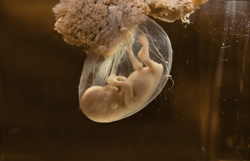Impact of environmental chemicals on embryos
Increasing evidence suggests that environmental chemicals (ECs) can pose a health hazard to embryos as they can pass into the mother through eating, drinking or skin contact. Once they reach the womb, these chemicals can cause endocrine disruption by mimicking or blocking the effects of hormones, thereby disrupting the physiological development of the embryo. To delineate the effects of ECs in the female reproduction system, the EU-funded ‘Reproductive effects of environmental chemicals in females’ (REEF) project performed a thorough analysis on mice, sheep and human aborted foetuses. Project partners exposed animals to certain chemicals and examined their effects on the reproductive systems of current and subsequent generations. In humans, embryos exposed to nicotine due to smoking by their mothers were considered as cases of ‘real life’ EC exposure. Scientists discovered that foetal ovaries were most sensitive to ECs late in pregnancy and the effects depended on the individual chemicals. Interestingly, the severity of these damaging effects was related to the species tested, and in mice they could pass on to the great grandchildren of the animals exposed to ECs while pregnant. An important finding of the REEF study was the revelation that women who smoked while pregnant increased the quantity of ECs reaching their foetuses and caused foetal ovary changes likely to reduce fertility in adulthood. These results verified and extended the known detrimental effects of smoking during pregnancy. Despite the different and complex effects of ECs on the female reproductive system depending on the stage of pregnancy during exposure, the gender of the foetus and the species under investigation, there was a unifying conclusion regarding the damaging effects of certain chemicals. Dissemination of project results is expected to raise public awareness on the issue and hopefully help the establishment of appropriate policies for EC management.

